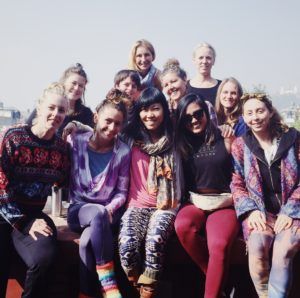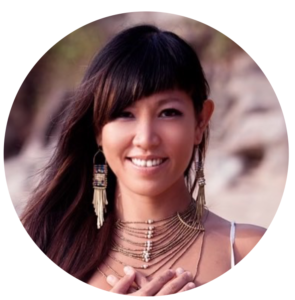Trauma-Informed Yoga Alliance Teacher Training
3rd – 12th April 2021
Ericeira, Portugal
Are you ready to learn about the effect of trauma on the mind, body, nervous system and upgrade your skills and qualifications as a yoga teacher?
If so, this specialized 100 Hour Trauma-Informed Yoga Teacher Training is for you!
Join a community of professionals who seek to ‘be the change,’ and embrace the chance for a deeper contribution in your community.
Located at the stunning beach location of Ericeria, Portugal, this Yoga Alliance ® Swara Yoga School certified training is designed to immerse you in a rejuvenating retreat experience, while upgrading your skills so you can safely support students’ healing in classes, retreats or as private clients.
Are you ready to make a difference in the world, sustained through yoga and a deeper understanding of trauma in the body-mind?
Led by Somatic Experiencing™ Therapist, yoga teacher, TEDx speaker, and social activist Atira Tan, ( MA Art Therapy, SEP, 500 E-RYT) founder of both Art to Healing, an Australian charity which supports the psychological recovery of sex-trafficked survivors, and Yoga for Freedom, which has raised over $60,000 for the fight against child sex slavery, together with other guest teachers.
Atira Tan has delivered numerous trauma-informed yoga programs internationally for over a decade, from the Australian desert with indigenous youth, to the refugee camps of Burma, stretching to the slums and brothels of Nepal, as well as published numerous peer reviewed research and books on her work in trauma recovery.
Together, daily yoga and Trauma Release Exercises (TRE®) classes, combined with lectures/workshops, mentoring, somatic psychology practices, teaching workshops, and hands-on dyads will be presented to provide a deep understanding of the impact unresolved trauma has on the mind, body, nervous system, ability to voice one’s needs and effect on our capacity to have compassion.
You’ll learn to spot patterns of physical/physiological with-holding, identify bodies that are ‘at risk’ of re-traumatization, discover how certain asana, pranayama and meditation practices can actually cause further suffering or injury, and how language used in class can trigger constriction and fear, rather than trust and relaxation, so that you’ll improve your ability as a safe presence to cultivate a supportive space, to promote deeper peace in the world.
Afternoon breaks and evenings offer time to relax, reflect and connect with each other, and to enjoy the majesty of the Atlantic ocean and the beach. You’ll also have ample opportunity embody the practices, honing your understanding of the material — including the cultivation of cross-cultural sensitivity and leadership skills on how to set up your own community yoga programs.
This training is ideal if you desire to:
* Upgrade your qualifications.
* Understand self-regulation.
* Learn about cross-cultural sensitivity.
* Cultivate your therapeutic presence.
*Learn the core concepts of Seva and Spiritual Activism.
* Spot students at risk of re-traumatization.
* Identify patterns of hidden trauma.
* Reduce the risk of student injury claims.
* Connect with a professional community.
*Pay it forward.
* Become an agent of change.
* Embody the benefits of TRE™ & Somatic Experiencing™.
* Create a peaceful, safer world.
* Set up your own Trauma Informed yoga program.
“Both Gemini and Atira are not only GREAT yoga teachers, they know everything there is to know about trauma and how to teach yoga accordingly. Not only are they great teachers; both of them also have amazing personalities and loveliest laughter and humour. Their standards are really high, so are their ethics.
I have learned SO much more than I could have ever expected. I highly recommend this teacher training to anyone interested in healing traumas of their own or/and others.”

The Curriculum
In this 100-hr Trauma-Informed Yoga Teacher Training you will not only gain a detailed understanding of the impact that trauma has on the body, mind and ability to voice one’s needs, and the effect this has on our capacity to be both present and at peace inside our own bodies, you will also learn to spot patterns of physical/physiological with-holding and identifying bodies that are ‘at risk’ of re-traumatization.
Discover how certain asana, pranayama and meditation practices can actually cause further suffering or injury, and how language used in class can also create constriction and fear, rather than trust and relaxation, so that, as teachers, you can improve your ability to be a therapeutic presence and cultivate a safe and supportive space, tailoring your classes to bring deeper safety for your students.
This is an addendum to a 200, 300 or 500 hr yoga teacher training designed to equip you with the skills to attune your classes or private sessions to work safely and supportively with specific communities suffering from anxiety, depression, grief, PTSD, CPTSD and unresolved trauma from abuse, surgery, injury, accidents or difficult pregnancy and birth, as well as the general population of yoga students who may be unaware of how trauma is impacting their mental, physical wellbeing and ability to deepen their yoga practice.
Many of our past students are now teaching trauma-informed yoga to marginalised populations such as at-risk youth and children, sex-trafficked women and girls, and women’s shelters around the world. We continue to mentor and supervise our students so that you can receive the proper support to take yoga off the mat, and into the world.
Schedule
| 7am | Yoga Practice |
| 9am | Breakfast Break |
| 10.30am | Lectures |
| 1 pm | Lunch Break |
| 3.30 pm | Lectures and Group Sessions |
| 6 pm | Embodied Somatic Sessions |
| 8 pm | Dinner |
OUR SUBJECTS
Subjects |
Key Objectives |
|
1. What is Trauma: How it Interrupts and impacts Our Ability to Relax, React and Respond |
|
|
2. Signs of Trauma: How to Spot and Safely Support Any Body That’s Holding Trauma |
|
|
3. TIY Class Content: Appropriate Touch, Asana, Cues, Communication, Container and Presence |
|
|
4. Resourcing, Regulation and Resilience: How to Offer Safety, Consent, Choice and Grounding |
|
|
5. Cross-Cultural Sensitivity: Taking Your Trauma-informed Yoga to the World |
|
|
6. Teaching TIY: Integrating, Evaluating and Creating Programs for Specific Communities. |
|
This YTT comprises of 80 hours of contact hours, and 20 hours of non-contact hours. Please note that there will be additional reading and homework assignments to integrate your learning will be required.


“Since the training, it’s been really exciting. I‘ve been teaching a trauma-informed yoga class at a private counselling centre for rape survivors, and I just got hired to teach at an outpatient treatment facility. I’ve also partnered with a local counsellor and we’re offering CEU classes for mental health professionals to learn how they can incorporate trauma-informed yoga techniques into their sessions.”
– Lisa Orozco, Equine Therapist & Yoga Teacher, USA
Portugal has been one of the best-kept secrets of Europe for decades. The most southern country of Europe and the doorway to the Atlantic make this small big country unique for their cultural heritage, stunning cliff beaches and delicious culinary flavours. The locals are friendly and laid back, welcoming everyone that comes from abroad to visit.
Picturesquely draped across sandstone cliffs above the blue Atlantic, sunny, whitewashed Ericeira, our location for this yoga teacher training, is popular with lisboêtas seeking a quick weekend getaway. It’s equally renowned for spectacular ocean vistas and excellent seafood restaurants and is also a mecca for surfers, who come here for the great waves and camaraderie. The town’s old centre is clustered around Praça da República, with the sprawl of newer development spreading south and north. Boasting pristine coastline and glorious beaches, Ericeira is also the only natural surf reserve in Europe.
Our venue for our Yoga Teacher Training is a boutique guesthouse, 5 minutes walk to the beach and the 2 minutes walk to the incredible cliffs of the west coast of Portugal. This location is a very peaceful place, ideal for the work that will do on the training and you have also surfing and hiking just at your doorstep. The studio is overlooking the Atlantic Ocean and surrounded by pristine nature.
In our training, diet plays a fundamental role. All our meals are vegan/vegetarian and 80% of the ingredients are organic. Most of the vegetables are coming directly from the local community and all the meals are prepared by a qualified macrobiotic chef.
Your accommodation package includes:
* 9 – nights accommodation in a standard single or twin room.
*3 delicious, healthy vegan & vegetarian meals a day.
*Unlimited Internet access.
*Your 100 Hr YA certificate and our PDF Course Manual.
*Pay-it-forward donation to Art to Healing to sponsor one woman to receive trauma recovery support.
Our Social Change Model
“Paying It Forward”
We believe that every girl and woman deserves to determine her future.
As part of our feminine social change model, this teacher training “pays it forward” to assist women and girls from Nepal who have experienced sex slavery and exploitation to also receive valuable therapeutic support and education.
$75 from your fee in this teacher training will sponsor ONE woman in Nepal to attend the Women’s Life Transformational Program, providing the chance for these girls to live a life free from slavery with our charity partner Art to Healing.
Investment
Registration Deposit: €300
This includes all tuition fees, your PDF trauma-informed manual, your yoga alliance certified certificate, all accommodation, 3 meals a day, and a contribution to our “Pay it Forward” social change initiative of supporting 1 woman who has experienced sex slavery in Nepal to also receive valuable women’s health education too.
Deluxe Single Package
FULL PRICE: €1950
Shared Twin Package
FULL PRICE: €1750
Simple Student Package
FULL PRICE: €1450
* Prices do not include airfare to/from Portugal or taxi fares to/from the Lisbon airport to Ericeira, please arrange your own travel. Ericeira is 35 minutes from Lisbon by car, and we can arrange airport transfer with a small extra charge.
** Non – Refundable Deposit of €300 required upon registration. Remainder amount is due on the 1st May 2020.
****Payment plans are available. Email atira@haveworldwilltravel.com/atira to discuss payment options.
YOUR TEACHERS
And we are super passionate about making a difference in the world through yoga!
Learn more about our yoga and social change projects.
Art to Healing:
Women’s Transformation Program
Atira Tan’s TED X Talk:
Inspired Action from the Heart
We would love for you to join us!
Please email Atira at atira@haveworldwilltravel.com/atira for further inquiries.
“I see your beauty.
I hear your feelings.
My wisdom flows from the Highest Source.
I salute that Source in you.
Let us work together for Unity and Love.”
– Gandhi












